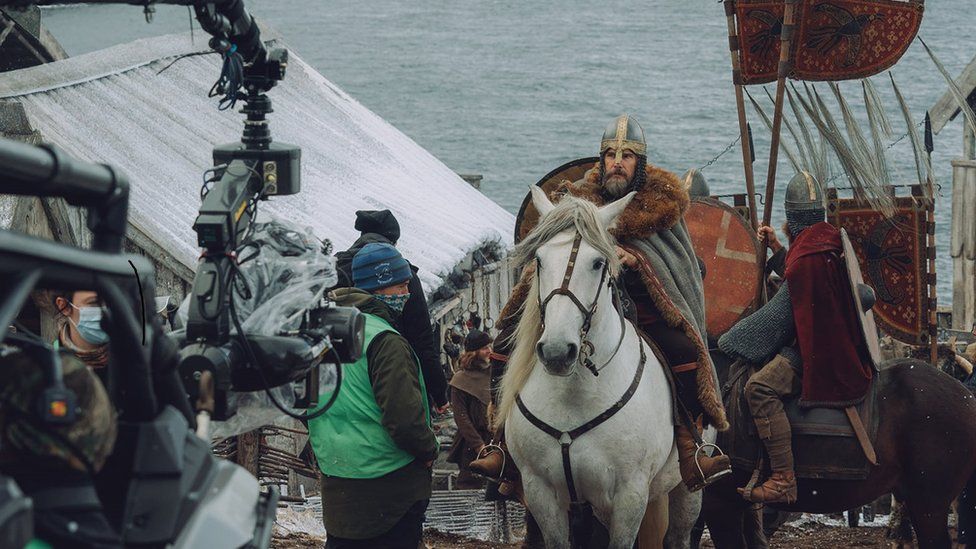ARTICLE AD BOX
 Image source, NI Screen
Image source, NI Screen
The Northman was filmed in Northern Ireland
By Niall Glynn
BBC News NI
The fact that Blade Runner 2099, a TV series based on the films, will be shot in Northern Ireland, has been seen as a huge vote of confidence in Northern Ireland's screen industry.
But is only the latest in a long line of high-profile successes.
The production follows in the footsteps of television hits like Game of Thrones and Line of Duty, as well as films such as The Northman - all of which which were shot in Northern Ireland.
And according to Northern Ireland Screen more are on their way.
"I would be very much hoping and expecting in the next couple of months that there'll be at least one further big announcement," NI Screen chief executive Richard Williams told BBC News NI.
The industry has become huge in Northern Ireland.
"Northern Ireland Screen supported projects that combined to over £1bn in terms of production budget in the last four years," said Mr Williams.
"Of that, something over £330m stuck on people, goods and services in Northern Ireland."
So why has Northern Ireland become so attractive to production companies?
Andrew Wilson is a location manager who has worked on Line of Duty, The Fall and Belfast, among others.
Image source, Andrew Wilson
Image caption,Andrew Wilson is a location manager who has worked on productions such as Line of Duty, Belfast and The Fall
"We're very small, that's a huge benefit that can't be underestimated because you're never two hours from anywhere here," he said.
"It's very attractive for us to be able to say 30 minutes from Belfast you can be on a beach, you can be half way up a mountain, you can be at any number of locations.
"Financially that's huge for a production, because if you travel for more than an hour you have to start to put the crew up overnight somewhere and it runs into huge money."
Another draw is Belfast's Titanic and Harbour studios.
"We did a Netflix job at the Harbour studio, there's people I was working with, who have worked many, many years in many different studios and that was, for them, the best one they'd ever worked in," Mr Wilson said.
There are also financial incentives for production companies through UK tax credits and discretionary funding that Northern Ireland Screen uses to augment that.
"Why do people look to here? These days because we're a centre of excellence. We're a hub," NI Screen's Richard Williams added.
"It's very competitive and it never gets any easier because the projects come and go, but Northern Ireland's in a good place."
Image source, NI Screen
Image caption,Belfast Harbour Studio is one of the draws for production companies
The average TV production could have around 150 people working on it day to day, while a larger film production would have more than 200.
As a location manager, Andrew Wilson said that can present a number of challenges.
"I remember trying to get 200 people to the very top of Tollymore forest, onto the foot of the Mournes [mountains], horses and everything," he said.
"We had to build roads, sometimes you have to do that, you're creating carparks, building roads, depending on the budget of the production you're on."
Mr Wilson said while recently working in Portaferry his department spent £30,000-40,000 in five or six days.
"That financial benefit goes directly to local businesses and to local people, a large chunk of it."
Image source, NI Screen
Image caption,Andrew Wilson says one of the attractions of Northern Ireland is that all sorts of locations can be found in close proximity
Crews from outside Northern Ireland will, of course, need somewhere to stay and those providing accommodation have certainly benefited from the industry.
Aileen Martin of the Hastings Hotel Group said during the Covid pandemic the screen industry was vital.
"Whenever the doors were closed and the lights were out and we didn't know what was round the corner, filming was seen as essential," she said.
"So there was the film the Northman and another one, The School for Good and Evil, and they were an absolute lifeline, they kept the doors open for the Europa, the Grand Central and the Culloden [hotels], kept people employed when everyone else was lights out."
From Hollywood to Holywood
In August, US novelist Adena Halpern wrote in glowing terms in the Hollywood Reporter about her time living in Northern Ireland's Holywood - in County Down - while her film director husband worked on Dungeons and Dragons: Honor Among Thieves.
Richard Williams said it is becoming common for those working in the industry to bring their families with them.
"Talent and high level executives are not immediately thinking they want to come and work out of Belfast," he said.
"But they find working for a period of time - sometimes quite a long period of time - in Northern Ireland can be very good in terms of work-life balance and that their family and loved ones can have a decent and enjoyable time while they're here."
Andrew Wilson said he has worked with "producers, directors from all over the world and they do have a good experience here, they enjoy Belfast, actors as well seem to enjoy it.
"There was a guy I worked with on [Netflix film] Lift for example, his wife had worked with him in Belfast previously and she loved it so much that she kind of talked him into doing the job so that she could come back and live here again for the guts of a year."
Image source, NI Screen
Image caption,Titanic Studios in the shadow of the famous Belfast shipyards
While the 2008 film City of Ember may not be the most well-known, Mr Wilson said it was very significant for filming in Northern Ireland.
"It was the first time Northern Ireland had ever hosted a major Hollywood production in its entirety," he said.
"Not long after, there was a movie called Your Highness that came in, which then in turn led to Game of Thrones."
NI Screen's Richard Williams said success in the screen industry "ultimately comes down to having hits".
"You never get to rest on your laurels, you always have to be looking out for the next thing that can be the knock-it-out-of-the-park success."

 2 years ago
35
2 years ago
35








 English (US) ·
English (US) ·